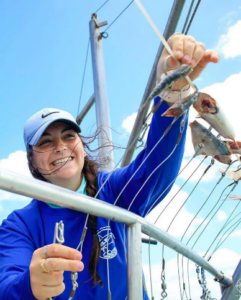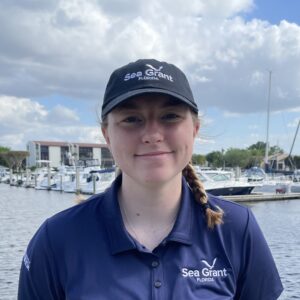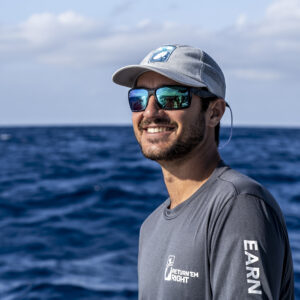
Coral Restoration Program
Britney
Swiniuch
Coral Restoration Coordinator
About
Britney Swiniuch is the Coral Restoration Coordinator with Florida Seagrant and assists the Department of Environmental Protection’s (DEP) Coral Restoration and Protection Program (CPR). She is responsible for managing coral restoration projects based on Florida State Priorities and also helps with facilitating funding administration to partners and entities. Her main duty is to help lead Florida’s Coral Reef Restoration and Recovery Initiative (FCR3). She manages all projects and allocates the $9.5 million grant associated with FCR3 to partners including Florida Universities and NGO’s. She also works closely with other state agencies like FWC to bridge their priorities and turn them into long term coral restoration realities! Britney holds a B.S in Natural Resources with an emphasis in Conservation Biology and a minor in Marine Science from The University of Arizona. Britney is originally from Tucson, Arizona and has interned at various institutions, but a notable experience for her in undergrad was working at the Biosphere 2 (B2) where she was the main lab technician, processing water samples from the B2 Ocean, Mangrove, and Coral Reef biomes. After graduating in 2020, (post covid restrictions) she decided to pursue her dream of becoming a marine biologist by attending the University of Miami’s Rosenstiel School of Marine, Atmospheric, and Earth Sciences. During her Master’s program, she was a member of Dr. Andrew Baker’s Coral Reef Future’s Lab, where she assessed stakeholders’ opinions of Assisted Gene Flow, and Assisted Migration. Britney loves being out in the field and was able to spend time as a TA for Dr. Catherine Macdonald and her Elasmobranch Field Course. She enjoys anything active including diving, camping, attending beach cleanups, and going to concerts.
Projects, Research & Specializations
Florida’s Coral Reef Restoration and Recovery Initiative (FCR3) is in progress, with phased efforts to: 1) increase the infrastructure for land based coral propagation facilities, and 2) increase restoration capacity. Overall, this initiative aims to decrease the impacts coastal flooding and storm surge have on heavily populated areas, enhancing shoreline protection. The five high priority species for FCR3 Phase 1 propagation are Colpophyllia natans (CNAT), Diploria labyrinthiformis (DLAB), Montastraea cavernosa (MCAV), Pseudodiploria strigosa (PSTR), and Orbicella faveolata (OFAV). The Department of Environmental Protection (DEP) will establish 5-10 restoration sites along FCR, with at least one site in each of the five counties bordering FCR: Monroe, Miami-Dade, Broward, Palm Beach, and Martin. In addition, the FCR3 Initiative will leverage its $9.5 million grant to support partners to expand land-based and in-water coral nursery infrastructure and capacity. These facilities along with university partners will rear, grow, outplant, and monitor the corals and other reef organisms used to restore selected areas of Florida’s Coral Reef.
The five high priority species for FCR3 Phase 1 propagation are Colpophyllia natans (CNAT), Diploria labyrinthiformis (DLAB), Montastraea cavernosa (MCAV), Pseudodiploria strigosa (PSTR), and Orbicella faveolata (OFAV). The Department of Environmental Protection (DEP) will establish 5-10 restoration sites along FCR, with at least one site in each of the five counties bordering FCR: Monroe, Miami-Dade, Broward, Palm Beach, and Martin. In addition, the FCR3 Initiative will leverage its $9.5 million grant to support partners to expand land-based and in-water coral nursery infrastructure and capacity. These facilities along with university partners will rear, grow, outplant, and monitor the corals and other reef organisms used to restore selected areas of Florida’s Coral Reef.
Get to Know Our Coordinators & Liaisons
Leveraged outreach and education coordinators and liaisons support initiatives in conjunction with our state agency and federal partners.









